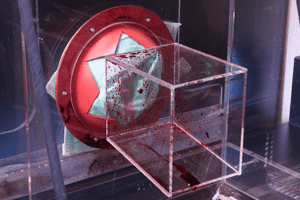The Synthetic Blood Penetration – Splash Resistance test is one of two synthetic blood resistance tests offered by Nelson Labs to determine a product’s ability to act as a barrier to blood-borne pathogens. The Splash Resistance test method challenges medical face masks with a fixed volume of synthetic blood directed at high velocity at the center of the mask.
This test is required by ASTM F2100 and is tested in compliance with ASTM F1862, ASTM F2100, EN 14683, and ISO 26609. Nelson Labs’ highly experienced staff provides a one-stop shop for all ASTM F2100 and EN 14683 testing.
Applicable Standards
- ASTM F1862
- ISO 22609
- ASTM F2100
- EN 14683



